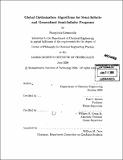Global optimization algorithms for semi-infinite and generalized semi-infinite programs
Author(s)
Lemonidis, Panayiotis
DownloadFull printable version (13.54Mb)
Other Contributors
Massachusetts Institute of Technology. Dept. of Chemical Engineering.
Advisor
Paul I. Barton and William H. Green, Jr.
Terms of use
Metadata
Show full item recordAbstract
The goals of this thesis are the development of global optimization algorithms for semi-infinite and generalized semi-infinite programs and the application of these algorithms to kinetic model reduction. The outstanding issue with semi-infinite programming (SIP) was a methodology that could provide a certificate of global optimality on finite termination for SIP with nonconvex functions participating. We have developed the first methodology that can generate guaranteed feasible points for SIP and provide e-global optimality on finite termination. The algorithm has been implemented in a branch-and-bound (B&B) framework and uses discretization coupled with convexification for the lower bounding problem and the interval constrained reformulation for the upper bounding problem. Within the framework of SIP we have also proposed a number of feasible-point methods that all rely on the same basic principle; the relaxation of the lower-level problem causes a restriction of the outer problem and vice versa. All these methodologies were tested using the Watson test set. It was concluded that the concave overestimation of the SIP constraint using McCormcick relaxations and a KKT treatment of the resulting expression is the most computationally expensive method but provides tighter bounds than the interval constrained reformulation or a concave overestimator of the SIP constraint followed by linearization. All methods can work very efficiently for small problems (1-3 parameters) but suffer from the drawback that in order to converge to the global solution value the parameter set needs to subdivided. Therefore, for problems with more than 4 parameters, intractable subproblems arise very high in the B&B tree and render global solution of the whole problem infeasible. (cont.) The second contribution of the thesis was the development of the first finite procedure that generates guaranteed feasible points and a certificate of e-global optimality for generalized semi-infinite programs (GSIP) with nonconvex functions participating. The algorithm employs interval extensions on the lower-level inequality constraints and then uses discretization and the interval constrained reformulation for the lower and upper bounding subproblems, respectively. We have demonstrated that our method can handle the irregular behavior of GSIP, such as the non-closedness of the feasible set, the existence of re-entrant corner points, the infimum not being attained and above all, problems with nonconvex functions participating. Finally, we have proposed an extensive test set consisting of both literature an original examples. Similar to the case of SIP, to guarantee e-convergence the parameter set needs to be subdivided and therefore, only small examples (1-3 parameters) can be handled in this framework in reasonable computational times (at present). The final contribution of the thesis was the development of techniques to provide optimal ranges of valid reduction between full and reduced kinetic models. First of all, we demonstrated that kinetic model reduction is a design centering problem and explored alternative optimization formulations such as SIP, GSIP and bilevel programming. Secondly, we showed that our SIP and GSIP techniques are probably not capable of handling large-scale systems, even if kinetic model reduction has a very special structure, because of the need for subdivision which leads to an explosion in the number of constraints. Finally, we propose alternative ways of estimating feasible regions of valid reduction using interval theory, critical points and line minimization.
Description
Thesis (Ph. D.)--Massachusetts Institute of Technology, Dept. of Chemical Engineering, 2008. Includes bibliographical references (p. 235-249).
Date issued
2008Department
Massachusetts Institute of Technology. Department of Chemical EngineeringPublisher
Massachusetts Institute of Technology
Keywords
Chemical Engineering.